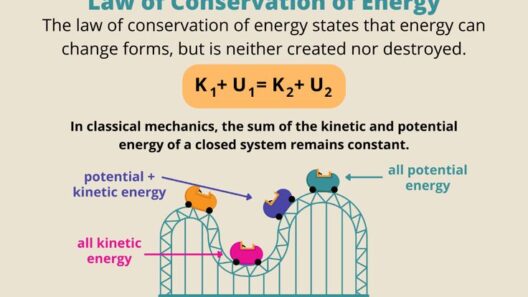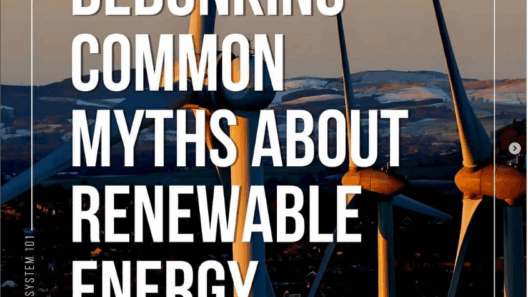At first glance, the concept of “conservation of energy” may appear as just another scientific principle, often relegated to the classrooms of physics students. However, its implications extend far beyond the confines of academia, touching upon essential tenets of environmental stewardship and sustainable living. When asking, “Is conservation of energy a form of energy itself?” one must delve deeper into both the philosophical and practical ramifications of energy conservation.
To fully understand this inquiry, it is vital to clarify what conservation of energy entails. The law of conservation of energy states that energy can neither be created nor destroyed; it only transforms from one form to another. This phenomenon is observable in natural processes and engineered systems alike. When fuel combusts in a vehicle, for instance, the chemical energy stored in the fuel is transformed into kinetic energy, enabling motion while emitting heat and light. Observing these transformations prompts an intrinsic fascination with energy’s various modalities, raising questions about how effectively we manage its utilization.
Energy conservation, in its essence, is not merely about efficiency; it embodies an ethical approach toward safeguarding resources that are finite. One may argue that the act of conserving energy serves as a conduit for exhibiting responsibility toward the planet. It is a practice underscored by deeper principles of morality and ethics. Engaging in energy conservation allows individuals—not just communities or industries—to participate in a global effort to mitigate anthropogenic impacts on the environment. Thus, one could posit that conservation of energy embodies a qualitative aspect that transcends mere quantification of energy itself.
Consider, for example, how rapidly our energy-consumptive behaviors have evolved. The last century has brought about unprecedented advancements in technology and living standards, facilitating an insatiable demand for energy. What was once a fleeting concept, renewable energy sources have now burgeoned into a robust alternative to fossil fuels. In this context, energy conservation emerges as both a solution to energy crises and a catalyst for embracing sustainable practices. It hints at the notion that our civilization’s future hinges upon our ability to balance energy consumption with ecological preservation.
Moreover, the psychological dimensions of energy conservation warrant exploration. The personal commitment to conserving energy—whether as simple as turning off lights when no longer needed or as complex as redesigning entire infrastructures—can evoke a sense of agency. It fosters an awareness regarding one’s carbon footprint and brings forth the realization that while energy itself is conserved through responsible practices, one’s actions can also amplify collective energy-saving outcomes. With this perspective, conservation of energy begins to take on a life of its own, functioning as a catalyzing force for societal change.
In a broader scope, one could argue that conservation of energy encapsulates elements of social justice. Energy poverty remains a critical challenge globally. The disparity in energy access raises ethical concerns and questions about equity. As we strive to reduce consumption, we must also consider how our energy practices affect marginalized communities. Advocating for energy conservation can lead to policy changes that prioritize equitable energy access. This holistic view underlines that conserving energy can indeed be a form of social currency, enabling communities to thrive economically and environmentally.
Furthermore, as we probe the realms of energy conservation, we must not neglect the role of innovation. Technological advancements have paved the way for smarter energy systems—think smart grids, energy storage solutions, and eco-friendly appliances. Engaging with these innovations emphasizes a forward-thinking approach to energy usage. Such advancements not only titillate the curiosity of inventors and scientists alike but also reinforce the idea that conservation is not stagnant; it evolves in tandem with our understanding and capabilities. Here, energy conservation metamorphoses into a bedrock principle that persists through experimentation and entrepreneurial zeal.
As we contemplate the essence of counseling for further energy conservation, we must embrace a circular economy. This modern paradigm encourages us to reconsider waste as a resource, advocating for methods to repurpose materials effectively while reducing overall energy consumption. This perspective shifts the narrative around conservation, revealing previously untapped potentials for sustainability. By adopting a multifaceted view of energy, we foster a culture that values resourcefulness and environmental integrity—key components in a comprehensive conservation strategy.
As we navigate through the ethical, psychological, and technological landscapes of energy conservation, we arrive at a crucial realization: energy conservation is much more than a mere act of saving. It constitutes a form of energy itself, resonating with environmental dynamism and ethical responsibility. Every action taken towards energy conservation bears consequences—the ripples of which can engender widespread ecological awareness and stewardship.
In conclusion, the journey to understanding whether conservation of energy is, in fact, a form of energy itself unveils a tapestry interwoven with deeper existential questions and evocative challenges. The act of conserving energy illuminates a pathway towards a sustainable future, marked by collective effort and individual commitment. By recognizing energy conservation as a dynamic process rather than a static value, we can invigorate our relationship with energy and the environment, ultimately fostering a more conscious and conscientious civilization.






